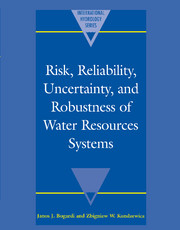Book contents
- Frontmatter
- Contents
- List of Contributors
- 1 Introduction
- 2 Integrated regional risk assessment and safety management: Challenge from Agenda 21
- 3 Risk analysis: The unbearable cleverness of bluffing
- 4 Aspects of uncertainty, reliability, and risk in flood forecasting systems incorporating weather radar
- 5 Probabilistic hydrometeorological forecasting
- 6 Flood risk management: Risk cartography for objective negotiations
- 7 Responses to the variability and increasing uncertainty of climate in Australia
- 8 Developing an indicator of a community's disaster risk awareness
- 9 Determination of capture zones of wells by Monte Carlo simulation
- 10 Controlling three levels of uncertainties for ecological risk models
- 11 Stochastic precipitation-runoff modeling for water yield from a semi-arid forested watershed
- 12 Regional assessment of the impact of climate change on the yield of water supply systems
- 13 Hydrological risk under nonstationary conditions changing hydroclimatological input
- 14 Fuzzy compromise approach to water resources systems planning under uncertainty
- 15 System and component uncertainties in water resources
- 16 Managing water quality under uncertainty: Application of a new stochastic branch and bound method
- 17 Uncertainty in risk analysis of water resources systems under climate change
- 18 Risk and reliability in water resources management: Theory and practice
- 19 Quantifying system sustainability using multiple risk criteria
- 20 Irreversibility and sustainability in water resources systems
- 21 Future of reservoirs and their management criteria
- 22 Performance criteria for multiunit reservoir operation and water allocation problems
- 23 Risk management for hydraulic systems under hydrological loads
2 - Integrated regional risk assessment and safety management: Challenge from Agenda 21
Published online by Cambridge University Press: 18 January 2010
- Frontmatter
- Contents
- List of Contributors
- 1 Introduction
- 2 Integrated regional risk assessment and safety management: Challenge from Agenda 21
- 3 Risk analysis: The unbearable cleverness of bluffing
- 4 Aspects of uncertainty, reliability, and risk in flood forecasting systems incorporating weather radar
- 5 Probabilistic hydrometeorological forecasting
- 6 Flood risk management: Risk cartography for objective negotiations
- 7 Responses to the variability and increasing uncertainty of climate in Australia
- 8 Developing an indicator of a community's disaster risk awareness
- 9 Determination of capture zones of wells by Monte Carlo simulation
- 10 Controlling three levels of uncertainties for ecological risk models
- 11 Stochastic precipitation-runoff modeling for water yield from a semi-arid forested watershed
- 12 Regional assessment of the impact of climate change on the yield of water supply systems
- 13 Hydrological risk under nonstationary conditions changing hydroclimatological input
- 14 Fuzzy compromise approach to water resources systems planning under uncertainty
- 15 System and component uncertainties in water resources
- 16 Managing water quality under uncertainty: Application of a new stochastic branch and bound method
- 17 Uncertainty in risk analysis of water resources systems under climate change
- 18 Risk and reliability in water resources management: Theory and practice
- 19 Quantifying system sustainability using multiple risk criteria
- 20 Irreversibility and sustainability in water resources systems
- 21 Future of reservoirs and their management criteria
- 22 Performance criteria for multiunit reservoir operation and water allocation problems
- 23 Risk management for hydraulic systems under hydrological loads
Summary
Motto: Sustainable is what people agree is sustainable.
Abstract
This chapter introduces the field of integrated regional risk assessment and safety management for energy and other complex industrial systems. The international initiative includes compilation of methods and guidelines, and development of various models and decision support systems to assist implementation of various tasks of risk assessment at the regional level. The merit of GIS methodology is highlighted.
INTRODUCTION
Almost ten years after the UNCED (United Nations Conference on Environment and Development), Rio de Janeiro, Brazil, 1992, some progress has been achieved in relation to the protection of the environment, development policies, and strategical future topics. A number of issues were addressed by UNCED – Agenda 21 that were connected with the topic of this chapter.
Issue 1. Achieving sustainable development, environmental protection shall constitute an integral part of the development process.
Issue 2. Environmental issues are best handled with the participation of all concerned citizens.
Issue 3. National authorities should endeavor to promote the internalization of environmental costs.
Issue 4. Information for decision making would involve:
the data gap;
availability of information.
Issue 5. Emergency planning and preparedness are integral parts of a coherent sustainable development.
Regional risk assessment and safety planning is a coordinated strategy for risk reduction and safety management in a spatially defined region, across a broad range of hazard sources. It deals equally with normal operation of plants as well as with accidental situations, including synergetic effects.
- Type
- Chapter
- Information
- Publisher: Cambridge University PressPrint publication year: 2002

